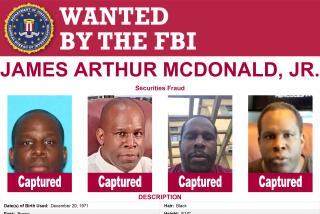SEC Calls for Rules on TV Stock Advisers to Require Disclosure
- Share via
WASHINGTON — From the venerable “Wall Street Week” to the fledgling “Stock Picks of the Week,” there’s a bull market in television programs offering investment advice. An estimated 50 shows vie for the viewer’s attention with pitches for everything from real estate seminars to penny stocks.
Under legislation proposed recently by the Securities and Exchange Commission, investment advisers who make recommendations over the airwaves would become subject for the first time to the antifraud provisions of securities laws. The SEC voted to ask Congress to amend the Investment Advisers Act of 1940 to make these provisions specifically apply to investment advisers appearing in broadcast, as well as print, media.
Were such an amendment to pass, these investment advisers could be subject to prosecution by the SEC if they failed to disclose material facts. For example, anyone who touted a stock in which he or she held an interest without informing the audience, or who was secretly paid by a company or a stockholder to do so, or who misrepresented his or her qualifications, might be charged with fraud.
On the other hand, a bona fide adviser could not be prosecuted merely for recommending, in good faith, a stock that later went sour.
Preliminary reaction from producers and participants in financial television shows was mixed. Tony Hoffman, host of “Everybody’s Money Matters,” which appears nationwide on cable television, called such legislation “long needed.”
“Although I would prefer a self-regulatory organization like the National Assn. of Securities Dealers, the (television) industry doesn’t want it. So I would back the SEC 100%.”
But Mark Estrin, senior vice president for programming at Financial News Network, declared: “FNN exists for the purpose of giving people a wide variety of points of view on investments in the same way that CBS gives a wide variety of views on major political issues. To say that the SEC should be looking over FNN’s shoulder because we are allowing people to give their views on investments is to put the SEC in a role that I don’t think it wants to be in and does not belong in.” The legislative proposal is the watchdog agency’s response to the Supreme Court’s ruling a year ago that the SEC could not require publishers of investment newsletters to register as investment advisers and, therefore, be subject to SEC regulations.
The case involved a convicted felon, Christopher L. Lowe, whom the SEC tried to stop from giving investment advice to the public via his newsletter. The SEC contended that Lowe could not publish without being registered, and it had revoked his registration.
In what was viewed as a First Amendment test, the high court ruled that the SEC could not prevent Lowe from publishing advice for the general public. However, the court did not take away the SEC’s power to prosecute any investment adviser who publishes false or misleading information. SEC General Counsel Daniel Goelzer expressed confidence that the SEC can still curb wrongdoers.
The proposed legislation would make clear that the SEC considers anyone who is principally involved in giving investment advice to the public through print or electronic media to be covered by fraud provisions, even though exempt from registration requirements.
Deserves Equal Treatment
“I think the SEC has shown tendencies in recent years to try to extend its jurisdiction in a manner that conflicts with the First Amendment,” said Myron Kandel, financial editor of Cable News Network. But when it comes to prosecuting fraud, which he strongly supports, “television deserves equal treatment with the print media,” he added.
The SEC’s decision to seek to add the words “or other communications media” to the 1940 statute was just a technological update and does not signify that the SEC plans to go after investment advisers who take to the tube, said Kathryn B. McGrath, director of the SEC’s investment management division. There is no evidence to suggest that the electronic media are worse than the print media. Indeed, Goelzer said he could not recall a television-investment fraud prosecution.
More to Read
The biggest entertainment stories
Get our big stories about Hollywood, film, television, music, arts, culture and more right in your inbox as soon as they publish.
You may occasionally receive promotional content from the Los Angeles Times.










